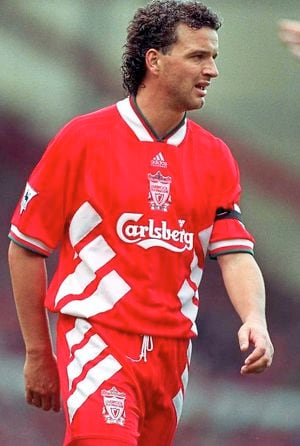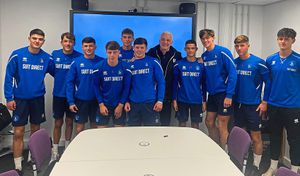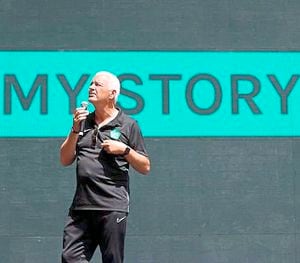Sexual abuse survivor and former Wolves man Paul Stewart is still fighting back
“Very often, I say when I am talking that I have lost my identity as a footballer,” Paul Stewart begins.
“When I am pointed out, it is often as being one of the footballers who was abused, rather than the guy who scored in an FA Cup Final or played for England.
“But do you know what? I don’t mind that. Because if that is what people are saying it means it is all out there in the open, and we are doing something positive.
As he himself admits, Stewart, now 58, is probably not best remembered for his spell on loan at Wolves, or with Saturday’s opponents Liverpool.
He may not even be remembered for achieving the rare feat of playing in a Manchester derby, a Merseyside derby, a North London derby and a Tyne/Wear derby. A great quiz question, that.
And fans of a younger generation perhaps would not even be aware that Stewart was on target for a winning Tottenham team in the 1991 FA Cup Final, nor that he won three England caps in 1991 and 1992.
But why those involved in football and particularly youth football should be forever grateful to Stewart is as being one of the courageous and inspirational band of footballers who waived their right to anonymity to reveal they had been sexually abused in the early stages of their careers.
Whilst Stewart’s football achievements should never ever be forgotten or lightly brushed aside – in truth they are perhaps even more notable given the demons he was battling in his mind throughout his career – in the realms of public consciousness they have probably been overshadowed by the horrors of what he endured.
And yet, he really doesn’t mind if his footballing successes are not as prominently profiled as the crucial work he is doing now.

Stewart now regularly delivers a Safeguarding in Sport workshop not only to players at academies but also regional FA staff and indeed any sports club or organisation with a need or desire to ensure they are protecting young people and vulnerable adults in their charge.
He is being kept very busy, recently putting in the motorway miles for trips as far apart as Hampden Park in Scotland and at Bournemouth, as well as delivering online to the welfare officers of the FA in Cornwall.
The powerful presentation is derived not just from qualifications Stewart has completed in recent years, but also painful personal experience, the devastating effects of which ultimately affected much of his adult life and led him to issues with drink and drugs and to the brink of suicide.
At the age of 11, on a late Autumn afternoon, the young Stewart was taken by football coach Frank Roper to the car park of vast and secluded playing fields which used to house Manchester City’s training ground.
There followed a 15-minute ordeal, the like of which would be repeated, at different locations, pretty much every single day for the next four years.
Roper threatened that he would kill Stewart’s parents and brothers if he ever said anything about what had transpired and so, paralysed with fear, the young and aspiring footballer never breathed a word.
His mind in turmoil due to not wanting to lose his dreams of becoming a professional footballer - which the coach from renowned junior club Nova was claiming to support - not to mention the threats made on his family, it was only when, at the age of 15, he snapped one day and pushed Roper away and ran from the car that Stewart finally felt able to break free from his clutches.
But while he had escaped physically, the mental scars were, completely understandably, far more difficult to shake off.
Still hiding and harbouring such a terrible truth, Stewart went on to enjoy his successful career but was still hindered by feelings of shame and so much pent-up anger at what he had experienced.
Addictions to drink and drugs would follow. Along with severe bouts of depression. He also considered taking his own life.
Finally, on November 18th, 2016, 41 years after the abuse had started, Stewart, now running a successful business, stumbled on a newspaper article in which another former footballer Andy Woodward spoke of the abuse he had suffered at the hands of another coach, Barry Bennell. It struck a chord due to there being so many similarities, and had a profound impact on Stewart, who felt compelled to follow suit, not just in support of Woodward but of all those who had been abused.
He was finally ready to tell his story.
“It is strange because after all those years it was a fairly quick decision to finally tell people what had happened,” Stewart recalls.
“I read Andy’s article, and actually started an email to a national newspaper on the Friday morning saying I was a former international footballer who had also been abused.
“Then I had to stop myself, as I realised I hadn’t even told my family and friends, and so I took the weekend to think it over and speak to them first.”
That Friday evening, Stewart and his wife Bev, and Bev’s twin Karen and her husband Ian, were heading to a Simply Red concert at Manchester Arena.
Before the concert, over dinner at San Carlo restaurant on a side street off Deansgate, Stewart revealed what he had kept hidden for over four decades. “I want to tell you something,” he began. And it all flooded out. Bev had long suspected something serious had happened to Stewart in his childhood, something he had kept locked away. He then had to tell parents Bert and Joyce, his grown-up children Adam, Chloe and Jade, and brothers Anthony and Gary, before meeting Daily Mirror journalist Jeremy Armstrong, whom he has since worked with on his book entitled ‘Damaged’.
Whilst Stewart, like all those who came forward at the time, wanted - and infact needed - to tell his story, both as a psychological release and a wake-up call to the authorities and the whole sport, that doesn’t dilute the fact it was still an ordeal. It needed an extraordinary amount of courage and willpower to get through it.
“Even though I wanted to tell my story, that doesn’t mean it wasn’t difficult,” he explains.
“I probably didn’t fully realise that because I had played for clubs like Manchester City, Spurs and Liverpool, because I had three England caps, the media interest was unbelievable.
“I was in danger of getting dragged from pillar to post, I was all over the place for a while.
“But as time went on, I managed to find a place where I felt comfortable talking about what had happened to me.
“As you can imagine, it affected my parents an awful lot, and the same with my brothers, where I am the youngest of three.
“They all felt that guilty, that they hadn’t protected me, but there was absolutely nothing they could have done as they were being groomed in exactly the same way that I was.
“I often get asked if I’m glad that I came forward and spoke out and initially I wasn’t sure.
“Now though, it’s a definite yes.

“Even if it’s difficult to go back to those days, it is also cathartic – believe it or not – and the more I talk about it the better it is for my constitution and wellbeing.”
How Stewart somehow managed to continue to live his life and enjoying such a successful career whilst hiding such devastating memories is an enquiry which he finds it difficult to answer.
“I often ask myself that very same question,” he admits.
“But listen, what I can probably say for sure, is that had I not finally spoken out, I don’t think I’d be here to have this conversation with you now.
“It would have carried on eating away at me, it would have finished me, because at times I have struggled really badly.
“Nowadays mental health is a topic which is talked about and is prevalent in society – and rightly so.
“But it was never really mentioned back then, nobody realised.
“I thought I had blocked everything out from what had happened to me as a kid, but obviously I hadn’t, as it manifested itself in other ways.
“That was the drink and the drugs, the depression, there were times when I really went off the rails.”
Having started his career at Blackpool, then moved on to Manchester City where for a time he occupied the same team as a certain Mick McCarthy, it was when he landed a move to Tottenham that Stewart started to particularly suffer with his mental health.
For a time, all was good, and life in London was fun, particularly with team mates like Paul Gascoigne – whom for a spell he shared a house with – and later-to-be Wolves defender Steve Sedgley. A night out was never too far away.
But Stewart was also now a Dad, and with Bev finding life easier back in Blackpool, she moved back there and would divide her time between the family home and visits to London.
Despite the lure of the bright lights and a group of excitable team-mates, at the end of the night out, loneliness would set in.
Stewart began to suffer with depression, and, an inability to open up about his feelings, in a large part due to the abuse he had previously experienced, stopped him from seeking help to find a solution.
As well as the drinking – on one occasion Stewart actually turned up for England duty the worse the wear – regular cocaine and ecstasy use followed, so by the time he joined Liverpool for £2.5million at the age of 27, his career was on a downward spiral rather than up.
“Liverpool was probably the worst time for me mentally and with the drugs and the drink,” he admits.
“They are such a big club, and should have been getting me at my peak, but they certainly didn’t get what they paid for.
“And when I look back on my career, even though I know I achieved a lot, there is also some frustration and regret.
"Had there been the support networks in place that there are now, had I felt able to speak freely and get help, I think my career would have taken a different path.
“I played three times for England, but if I was in a better place, I think I could have played 50 times, and I made 42 appearances for Liverpool, which could have been 242.
“I had faith in my ability but what I was doing off the field made it impossible to perform consistently at the highest level.
“With having more support, I think I would have enjoyed it a lot more as well, and talked about it more fondly.
“It’s why it’s good that there is so much more support these days, so much talk about mental health.
“When I talk to young players at clubs, I tell them that whatever their problem might be, don’t worry, because they have a support network in place and they can always speak to someone.
“I promise them that if they talk to people it will help with any off-the-pitch worries and that playing with a smile on their face will make them even better as a footballer.
“Hopefully, because of the experiences that I had, they listen, and whilst I think it is making a difference, I will continue to bang the drum to try and help.”
Roper died in 2005 without ever facing justice, and many other abusers have also passed away, but Stewart admits there are still people out there who are searching for potential victims.
And that while the world of sport is now far more alert to the threat, the arrival of social media means it is imperative to keep the conversation going.
“We are all working hard to stop them but they are working twice as hard to try and access our children, and it is important to make young people aware of how they might operate,” is Stewart’s warning.
It is those warnings, and the help and assistance which has been passed on by such a large group of players who suffered so much in their childhoods which has most definitely helped reduce the risks for future generations.
But, despite the understandable profile around the subject, that courageous band of brothers should not be defined solely by their experiences, but also for the footballing talent and hard work which gave them their careers in the first place.

Stewart’s spell with Tottenham included that FA Cup Final win against Nottingham Forest in 1991 where not only did he score and then flick on the corner from which Des Walker headed the decisive own goal, he was also named Man of the Match. That remains Spurs’ most recent FA Cup success.
That was one of many achievements, across many different seasons.
“There are so many fine lines in football and the one great season I had with Manchester City, when I scored 24 goals, probably only happened because new signing Tony Adcock picked up an injury,” he recalls.
“That helped get the move to Tottenham, which was definitely my most enjoyable time.
“Not just because of the cup final, but at Spurs I moved back from being a striker to midfield, playing alongside a certain Paul Gascoigne.
“What an easy gig that was.
“All I needed to do was make sure I won the ball and, when I got it, at every opportunity give it to Gazza and he would produce the magic that made us look like a good partnership!”
At Liverpool, as the off-field struggles took their toll, Wolves was one of several loan spells as Stewart made ten appearances under Graham Taylor, the manager who had given him his trio of England caps.
It started well. Stewart’s home debut, on the day that Molineux paid tribute to Billy Wright, saw him notch the first goal in a 2-0 win against Tranmere. But in scoring the goal, a collision with former Wolves keeper Eric Nixon caused an ankle injury which affected his impact. He returned, and would grab another goal against Luton, but hopes of a permanent deal never quite materialised.
“I came back from injury a bit earlier than I should have but towards the end at Wolves it all went a bit sour,” Stewart recalls.
“Graham actually got me in the manager’s office and offered me a contract, so we were discussing me joining permanently.
“Then we had a game against Derby, and I was still playing with an injury, and the crowd were getting on to me.
“I was called back in to see Graham on the Monday morning and he told me he had changed his mind and Wolves would no longer be signing me.
“I didn’t go mad or anything, I just stood up, shook his hand and said if that’s how you do business, I am glad I didn’t end up signing.
“It was one of those things that happens in football, but I’ll be honest, I was disappointed, gutted infact.

“The Wolves fans were brilliant really in terms of how they supported the club – come rain or shine they turned up in their droves just as they are now.
“I wasn’t in the right frame of mind and the fans were right to get on my back because I wasn’t performing but I was hoping it was something that was going to resurrect my career.
“I still only have fond memories believe it or not, of the town and the club, but it just didn’t work out for me at that time.”
There was certainly plenty of excitement on one particular evening, when Stewart and then Wolves team-mate Geoff Thomas were joined by Gazza for a night out.
At the time, with venues like the Light Bar, the Theatre Bar and Picasso’s, that section of Wolverhampton was a hotbed of the local nightlife scene, and none more so when English footballer’s latest superstar was in town!
“That was the time when you could go into pubs and bars quite happily and mix with fans,” says Stewart.
“Gazza came up because he was still recovering from his injury and the three of us went out on the town - as they say - and had a really good night.”
The swansong of Stewart’s career with Sunderland brought a promotion to the Premier League, whilst his last appearance, before dropping into non-league, came with Stoke City, 25 years ago next month.
Later setting up his own successful business, as well as being inducted into Blackpool’s Hall of Fame, Stewart was catapulted back into the footballing arena when coming forward to tell his story.
And yet, revisiting his childhood and raising awareness of what he went through all those years ago has sadly not proved the end of the trauma Stewart has had to experience.
Wife Bev, such an immovable pillar of strength in the days and months which followed his revelations, passed away towards the end of 2020 at the age of 56.
They had met when they were 18 and were married for 34 years.
“I still struggle if I’m honest,” says Stewart.
“Grief is an emotion which I never really understood in terms of the effect it can have on a human being.
“For me it might be a smell, a song, something on the TV, or just going to a particular place, and all of a sudden, it’s overwhelming.
“I would never want anyone else to go through what has happened to me, but the work helps, it keeps me busy and takes my mind off things.
“It’s probably been a fight to survive at times, another one, but I’ve got a lovely granddaughter Sienna, and need to make sure I am the best I can be for her and our three children.
“They are struggling as well of course, they’ve lost their Mum, and it’s been a very difficult time for all of us.”
When Stewart told his story, over six years ago, he was contacted by several of his former team-mates who expressed shock purely because of how the strength he showed on the football pitch.
“I came across on the pitch as someone with a strong mental attitude, someone who could handle myself and not a soft touch,” he insists.
“But it just shows how it can happen to anyone.”
It is in the strength he has shown since, strength in life rather than in football, which perhaps explains why Stewart’s place in the game now is regarded as just as important – if not more so – than all the goals and assists he provided on the pitch.
And long may that continue.
• Click https://paulstewartofficial.com to view Paul’s website and details of his work.





